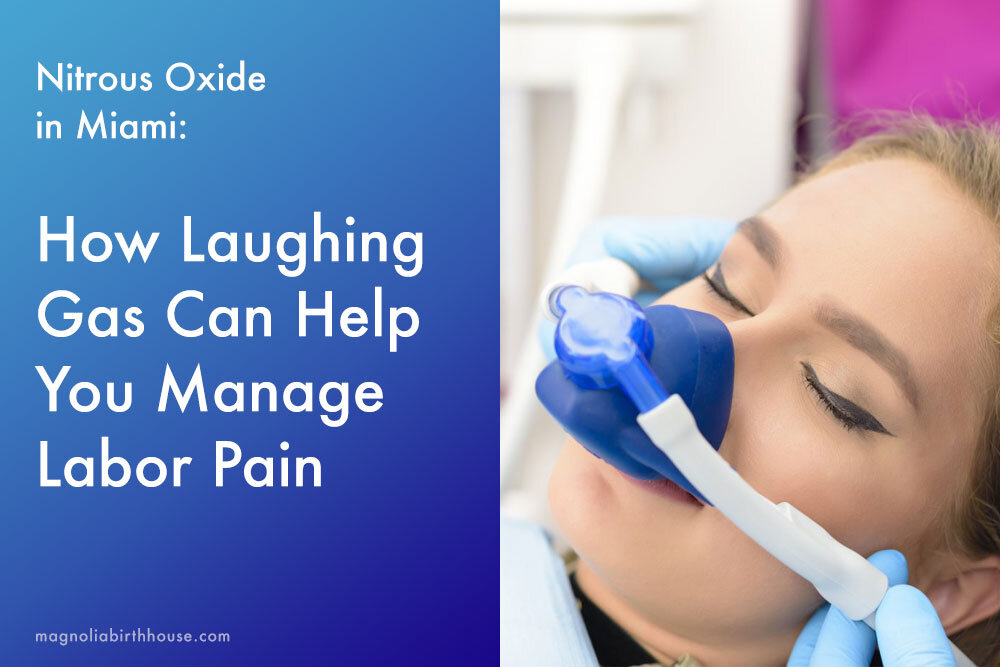At Magnolia Birth House, we’ve always been committed to providing you with education on managing contractions. Up until recently, the only available techniques for pain relief at our birth center were natural methods like movement and hydrotherapy.
While we stand by those unmedicated comfort measures, we are excited to offer nitrous oxide starting in early 2022. Nitrous can be an effective option for birthing parents who want medicated pain relief, but something that is not invasive.
Nitrous oxide has been used widely in the United Kingdom, Sweden, Finland, Canada, and Australia for decades, but its popularity has only recently grown in the United States.
Still, you might be wondering, “What is nitrous oxide?” and “Is nitrous oxide during labor safe?” We are going to answer those questions and more, so you can decide if nitrous oxide during labor is something you’d like to explore.
What is Nitrous Oxide and How Does it Work?
Sometimes called laughing gas, nitrous oxide (N2O) is an odorless, tasteless, colorless gas that’s typically mixed 50/50 with oxygen for birthing parents. You use it by inhaling it through a mask that covers your mouth and nose.
Nitrous oxide is a medicated comfort measure, and it’s a systemic drug, meaning it reaches your whole body. It helps manage pain without causing a total loss of feeling or any loss of muscle movement.
According to Nurture by Erica Chidi Coen, nitrous oxide doesn’t interfere with labor and isn’t a painkiller. “You’ll still feel your labor and contractions, but you’ll feel indifferent to the pain,” she writes. We often describe nitrous as something that “takes the edge off,” and some moms report that it creates feelings of relaxation and well-being.
When using nitrous oxide during labor, it’s best to begin inhaling it 30-45 seconds before the contraction begins. You will have to learn how to time your inhales, and it might take three or four contractions to get the hang of it. The goal is for the drug to peak at the same time as the contraction.
Is Nitrous Oxide During Labor Safe?
Evidence shows that nitrous oxide is safe in low doses, like those used during labor. It’s important that midwives are trained on how to administer it and birthing parents are educated on how to use it.
The American College of Nurse-Midwives Position Statement on nitrous oxide notes: “Research has supported the reasonable efficacy, safety, and unique and beneficial qualities of N2O as an analgesic for labor and its use as a widely accepted component of quality maternity care.”
Research is continuing, but available studies have found that the amount of nitrous oxide used during labor does not affect the health of the baby. There also appears to be no effect on a newborn's alertness or ability to breastfeed.
What are the Benefits of Nitrous Oxide During Labor?
When it comes to nitrous, there are several unique pros. These include:
Nitrous oxide can be administered quickly and easily. Unlike deciding to get an epidural in a hospital, you don’t have to wait for an anesthesiologist to receive nitrous. Once you begin inhaling the gas, it works rapidly.
You self-administer the nitrous oxide, so you control when and how much of the gas you use. You can even use it in the birthing tub if you’re planning a water birth.
You can stop using nitrous oxide easily and quickly at any time. The effects begin to fade immediately and are completely gone within five minutes. There are no residual effects.
Nitrous oxide does not negatively affect labor progress, nor does it require invasive monitoring. There are no increased risks of complications for moms or babies.
Side effects are minor. The most common complaints are dizziness, nausea, and vomiting.
Are There Situations When Nitrous Oxide is Not Recommended?
Yes, there are a few times when nitrous oxide is not appropriate. Expectant parents who have experienced the following should not use laughing gas.
Vitamin B12 deficiency — Research has demonstrated that folks with a vitamin B12 deficiency are at a greater risk of developing certain acute conditions and neurotoxic symptoms.
Recent inner ear surgery, past gastric bypass, or collapsed lungs — Can create air pockets in the body. Nitrous oxide can enter them and cause expansion.
Musculoskeletal disease or similar impairments — Such conditions can prevent individuals from holding the mask themselves.
Nitrous Oxide at Magnolia, Miami’s Premier Natural Birthing Center
We are pleased to be able to offer nitrous oxide at Magnolia starting next January. Overall, nitrous oxide is a safe, simple, and affordable analgesia for laboring parents. At Magnolia, the fee for N2O is $250 — $200 for use of the nitrous and $50 for the individualized kit.
To learn more about nitrous oxide and other benefits of Magnolia’s high-quality care, fill out our form to set up a free consultation.






